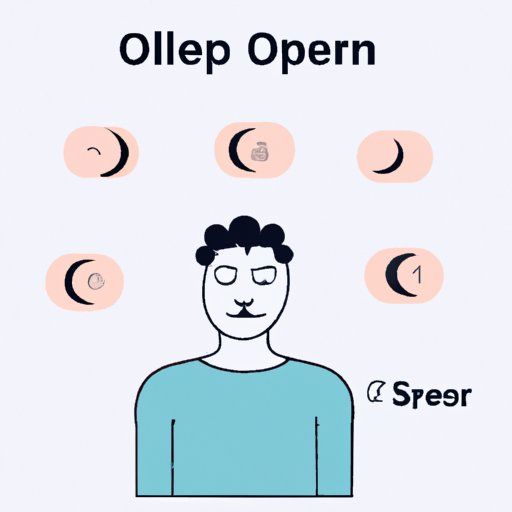Introduction
When it comes to getting a good night’s rest, most of us have heard the phrase “shut your eyes and you’ll be asleep in no time.” But does closing your eyes really count as sleeping? In this article, we’ll take a look at the science behind sleep and investigate whether or not closing your eyes is enough to count as sleeping.
Exploring the Science of Sleep: Does Closing Your Eyes Count as Sleeping?
The process of falling asleep is a complex one that involves transitioning from wakefulness to sleep. To understand if closing your eyes is enough to count as sleeping, it’s important to understand what actually happens during this transition. During wakefulness, the brain is active and alert, while during sleep, the brain is in a state of rest. As we drift off to sleep, the brain begins to produce certain chemicals that help to relax the body and make us sleepy. This is known as the sleep-wake cycle and it is essential for getting a good night’s rest.
But just because your eyes are closed doesn’t necessarily mean you’re asleep. To fall into a deep, restorative sleep, our bodies must go through several stages. During these stages, the brain produces different types of chemicals that help to relax the body and make us feel sleepy. And, even though our eyes may be closed, if our brains aren’t producing the right types of chemicals, then we can’t truly be said to be asleep.
The Difference Between Napping and Sleeping: Is Closing Your Eyes Enough?
Closing your eyes can be an effective way to take a quick nap and recharge. However, it’s important to understand the difference between a nap and a full night’s sleep. A nap typically lasts between 15 to 45 minutes and is intended to provide a short burst of energy. On the other hand, a full night’s sleep typically lasts between 7 to 9 hours and is essential for physical and mental health.
So, while closing your eyes can be a great way to get a quick boost of energy, it’s not enough to count as real sleep. In order to get the full benefits of a good night’s rest, our bodies need to go through all of the stages of sleep. Only then can we experience the full range of health benefits associated with a full night’s sleep.
Investigating the Benefits of Shutting Your Eyes: What Counts as Sleep?
It’s important to remember that just because your eyes are closed doesn’t necessarily mean you’re asleep. In fact, there is a common misconception that closing your eyes equals sleep. However, this isn’t true. To truly be considered asleep, your body needs to go through all of the stages of sleep. So, while shutting your eyes can be beneficial, it’s not enough to count as real sleep.
So, what are the benefits of simply closing your eyes? Well, when we shut our eyes, our bodies begin to relax. This relaxation can help reduce stress and tension, which can lead to better overall mental and physical health. Additionally, closing your eyes can help to reduce distractions and promote focus, which can be beneficial for studying and work.
Examining the Effects of Closing Your Eyes and Nodding Off: Is it Real Sleep?
While closing your eyes can be beneficial, it’s important to understand that it’s not the same as getting a full night’s rest. When we close our eyes and nod off, we don’t go through all of the stages of sleep. As a result, we don’t get the full benefits of a good night’s sleep, such as improved memory, increased alertness, and better moods.
Additionally, not getting enough sleep can have serious consequences. Not getting enough sleep can lead to a weakened immune system, decreased concentration, and impaired decision-making skills. It can also increase the risk of obesity, heart disease, and diabetes. So, it’s important to make sure you’re getting enough sleep each night.
Conclusion
In conclusion, closing your eyes can be beneficial, but it’s not enough to count as real sleep. To truly experience the benefits of a good night’s rest, our bodies need to go through all of the stages of sleep. Additionally, not getting enough sleep can have serious health consequences. For these reasons, it’s important to make sure you’re getting enough sleep each night.
To ensure you’re getting a good night’s rest, it’s important to practice good sleep hygiene. This includes avoiding caffeine and alcohol before bed, keeping your bedroom dark and cool, and avoiding screens before bedtime. By following these tips, you can ensure you’re getting the restful sleep your body needs.


